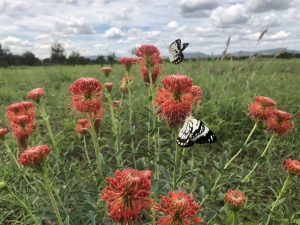
Dennis Donohoe, farm manager with Aminya Pastoral, is a seasoned producer with decades of experience, and his story is a testament to how even minor changes in farming practices can lead to significant improvements in productivity and land health.
So many farmers and producers take great personal pride in the natural assets on their farms. They observe how, under their management, these natural values are improving, maturing and becoming more valuable – greater diversity of plants and animals, clearer water in creeks and dams, healthier soils with increasing levels of organic matter, carbon and soil animal life. Many of these natural assets provide important benefits to farmers’ production and operations, but also to the wider community. These are known as ecosystem services. Clean water improves animal production, but also provides downstream communities with good drinking water that requires less treatment before use. Trees and woodlands are carbon sinks and wildlife habitat, both of which benefit the wider community.
The wider community is expecting increasingly greater transparency of food and fibre production and greater accountability from their financiers and investments. Markets are increasingly looking for, and demanding evidence of positive climate, nature and societal outcomes from their value chains and investments to demonstrate their commitments and contributions to meeting climate targets, reporting on Environment, Social and Governance (ESG) accountabilities, and demonstrating corporate social responsibility.

These trends are rapidly escalating because of:
Regenerative food and fibre production is becoming of increasing interest to markets because it is generally nature-positive, reduces climate risk, promotes farmer wellbeing and delivers healthy and nutritious food to consumers. The regenerative nature of production provides corporates with measurable performance indicators to support their reporting and accounting against climate, nature and social targets and obligations.
Value chain suppliers with corporate commitments to climate, nature and social performance are experiencing challenges in establishing effective and efficient systems/processes to measure, verify and report on climate, nature and social outcomes within their value chains. This is particularly true of the red meat sector, owing to the complexity of the value chain, and the relative impacts of market share versus price premium on actors within the value chain.
Finance institutions are increasingly aware of the multiple attributes of regenerative agriculture that mitigate risks – including business and financial, climate, nature and social responsibility risks. Investors are increasingly interested in the performance of their portfolios, and finance institutions are currently developing frameworks to demonstrate this performance (e.g. CBA, Rabobank, NAB). It is anticipated that Agri-banks will progressively favour agri-businesses that can demonstrate the application of regenerative principles and the resulting outcomes in their drive to minimise risk and optimise reputation and performance credentials.
There is a hive of activity currently in Australia and globally around the development of frameworks for climate, nature and social accounting, but many continue to require audits of inputs, plans and processes rather than looking at outcomes. Many are single-topic, for example Science Based Targets for Climate.
Great farm outcomes often go hand-in-hand with indicators of farmer well-being and signs of a healthy business and successful production. How good would it be to collate these great outcomes to tell a comprehensive story of your farm stewardship and the rewards it brings you and others? RCS can help you do this, and we are in the process of developing Farm Portrait, which will collect and analyse ecological and well-being metrics over time, verify management decisions and report on outcomes at the farm level.
RCS Australia has a team ready to work with you and can advise on how to make the most of your natural assets. We are approved advisors in Queensland for Land Restoration Fund carbon farming projects, and trained farm advisors.
Originally authored by Leanne Sommer 2022
Republished 2023
Profitable Paddocks is our educational newsletter sent to your email inbox every quarter.
Click the Bell for the latest blogs.

Dennis Donohoe, farm manager with Aminya Pastoral, is a seasoned producer with decades of experience, and his story is a testament to how even minor changes in farming practices can lead to significant improvements in productivity and land health.
Once you have ownership as to why planning is important, the next ingredient is to work out where and how you will do your planning. When you write something down you change your relationship with the content. I cannot emphasise enough the power of getting your thoughts and plans out of your head onto paper or the computer.
The season in SA and Tassie is particularly tight right now with little or no useful rain since early January and a generally failed 2023 spring prior to that. Right now, across southern Australia and much of the eastern NSW, you won’t need to drive far out into the countryside to see cattle and sheep grazing (and lying on) hay and silage trails lined across paddocks.
Martha Lindstad and partner Robert James are farm managers on ‘Karalee’, Enngonia NSW. Both have travelled different paths to being where they are. Martha is originally from Norway, growing up on a three hectare farm before travelling to New Zealand and eventually the Pilbara in Western Australia. It was here that she saw the benefits of sustainable farming for the country and livestock.
The Prince’s RCS mentor, Raymond Stacey, sees a strong future ahead for Simon and Laura. “The Drought Resilient Soils and Landscapes project is about supporting graziers to manage their country and businesses better,” Raymond said. “I see an operation here where they’re working hard on their planning and putting their plans into action to leave their country, business and people in better shape.”

Join our mailing list
